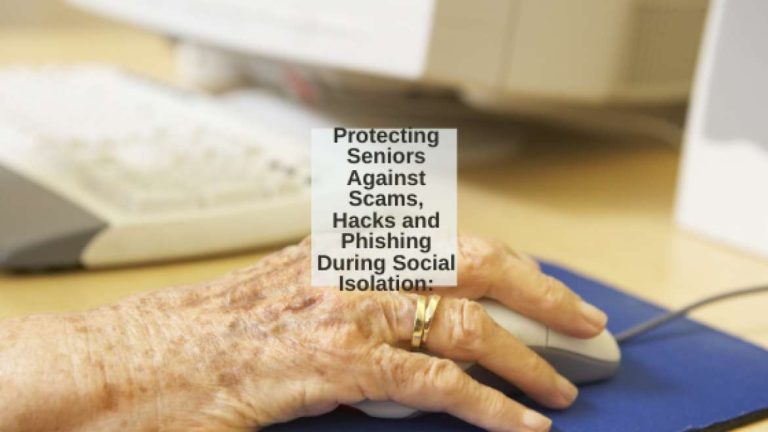During this time of social isolation, seniors’ computers, smartphones and home phones are their safe connections to friends and family. Unfortunately, these same technologies can open the door to uninvited guests who don’t have their best interests at heart.
Protecting seniors from threats in the online world is important. Older adults lose almost $3 billion to scammers and hackers each year. With seniors’ loneliness and their dependency on technology only increasing during the pandemic, hackers are taking advantage of older adults’ time on the web and their desire for human connection to steal their hard-earned money.
If you have an older adult in your life who may be susceptible to online scams, it’s important to be diligent in your own education of current threats and help your loved one stand up to those willing to steal their trust and their money.
Be Aware of These Threats
Scammers and hackers are master manipulators and amateur psychologists. They know exactly how to play to elderly adults’ emotions, worries and concerns, and they develop strategies that capitalize on what will get the fastest reaction and the largest payout from victims.
Get-rich-quick schemes – For seniors already on limited incomes, the promise of additional money can be too good to pass up. Scammers may tell a senior they won a sweepstakes and request a small handling fee so that the older adult can claim their prize.
Threats and impersonation – A caller may pretend to be a government or IRS official requesting a back-tax payment or a medical biller insisting a charge be paid on the spot to avoid reporting the senior to collections. Scammers may request the victim’s credit card number, Social Security number or bank account numbers, and because these “official” threats come at older adults so fast and demanding, they feel obligated to respond.
Technology frauds – By pretending to be a representative from a senior’s email provider or computer company, scammers can convince an older adult to provide access to their accounts so they can “fix” a problem with their computer. Once they have access, they can install malware, sneak into your loved one’s financial accounts, and hack into their social media.
Phishing emails – Scammers are skilled at making fake emails from familiar companies appear legit. For instance, they can pretend to be a bank requesting a senior’s username and password to update their account information.
Dating scams – Online dating continues to grow among seniors. Within the past year, 29% of seniors reported going on a date with someone they met on a dating website. Fraud occurs when a scammer who pledges their love requests financial help from their companion—it’s especially problematic when a lonely senior has never met their beloved in person.
How you can protect and empower the senior in your life
Every year, up to three million seniors are the victims of an online scam or hack, but only one in 44 ever tell anyone out of embarrassment or fear. But the reality is, almost all of us—at any age—have been defrauded at some time in our lives. Fifty-six percent of adults have been at the losing end of fraud, and 54 percent of us have had our accounts hacked.
By helping your loved one understand scams and hacks can happen to anyone, you can prepare them to be on the watch for fraud, and if it does occur, to be open about their experience and find a way to fight back.
What are some of the ways you can help your loved one?
Go over financial accounts together. Ask your loved one if you can sit alongside them as they check their financial statements each month to identify any unusual activity. Remind them not to give their account information to anyone unless they initiate the first contact. It’s also a good idea to have them monitor their credit ratings for unusual activity at www.annualcreditreport.com.
Reinforce that it’s OK to be rude. Seniors are often willing victims because it’s hard to say no, especially if someone is asking for something so nicely—or if they come at them with a threat. It’s their right to hang up on an unsolicited call or delete an email if they have a bad feeling in their gut. If the solicitor insists on payment, encourage your loved one to ask them to send their request in writing and stop the conversation immediately.
Teach them to spot phishing emails. Warning signs like misspellings, asking for account information or jumbled addresses in the “From” line can all signal that an email from a company your loved one trusts isn’t legit. In addition, stress to them not to click on links or open attachments from an unsolicited email. For examples of phishing emails, visit the National Cybersecurity Alliance website together for more details.
Help them protect their identity. Encourage your loved one to shred paperwork with their account numbers. Assist them in signing up for the National Do Not Call Registry, opting out of credit and insurance mail solicitations at OptOutPrescreen.com, and redirecting their mailed checks to direct deposit to prevent mailbox theft.
Stay connected! The biggest risk factor for scams, fraud and hacking is loneliness. With social isolation still recommended for seniors during COVID-19, they need socialization more than ever. Talk to your loved one on a regular basis, and while visiting, keep them updated about online threats targeting seniors. The AARP Scam-Tracking Map spotlights current scams and provides older adults an option to submit a report if they’ve been targeted.
If you’re concerned about your senior falling victim to a scam, and they’re receiving services from AccuCare Home Health Care of St. Louis, please give us a call at 314-692-0020. Our nurses and aides can keep an eye out for possible warning signs and remind your senior about the steps they can take to protect themselves online.






